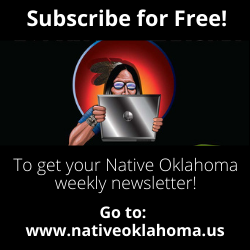

Tribes keep opting out of Oklahoma governor's reservation task force, calling it flawed

by Molly Young, The Oklahoman
The boycott of Gov. Kevin Stitt’s new task force to fix “broken” criminal justice systems on tribal reservations expanded Monday after two more prominent tribal leaders announced they wanted no part in the group.
Gary Batton, the chief of the Choctaw Nation, and David Hill, the principal chief of the Muscogee Nation, said the task force appeared to be based on the false belief that state and tribal police officers aren’t working together on the ground. They joined Chuck Hoskin Jr., the principal chief of the Cherokee Nation, in declining to participate.
The leaders represent the three largest tribals nations in Oklahoma, which count a total of nearly 800,000 citizens. Their decisions to shun the governor’s task force signal how far apart Stitt remains from influential tribal leaders on key criminal justice issues. The developments also underscore how little relations have improved in the one year since the governor pledged a “new day” working with tribes.
“We cannot participate in any endeavor aimed at weakening tribal nations, and, by extension, harming public safety,” Hill said in a statement explaining why his east-central Oklahoma tribe would not join the task force.
Chickasaw Nation also criticizes Gov. Kevin Stitt's task force
The task force also drew criticism from Gov. Bill Anoatubby of the Chickasaw Nation. He did not reject the group altogether but said Chickasaw leaders “would be reluctant to ask someone to participate.”
“The goal seems to be the dismantling of a new system that is quite successful within the Chickasaw Nation,” Anoatubby said in a statement.
A spokesperson for the governor did not respond to questions about the tribal leaders’ decisions, but said Friday that Stitt still planned to include voices from large and small tribes on the task force.
It is becoming increasingly unclear who those tribal representatives might be.
Hill and Hoskin also have accused Stitt of trying to create confusion ahead of the task force’s first meeting by pressuring a state agency to suspend its working agreement with tribal police. The Grand River Dam Authority notified both tribes Friday that it would no longer allow tribal officers to act on its behalf.
The governor has not confirmed or denied their claim that he directed the move. A spokesperson said Stitt had asked “for consistency from all state law enforcement” in light of a December dustup between Muscogee Nation police and Okmulgee County jail employees.
Why did Gov. Kevin Stitt create the task force?
Stitt created the task force in response to the dispute, ordering the group to examine criminal justice issues on the reservations and recommend fixes that would eliminate confusion among law enforcement agencies on the ground.
No tribal leader has been guaranteed a seat on the 13-person task force. But Stitt did reserve two spots for representatives of tribal nations.
Batton, Hill or Hoskin could have potentially filled the slot reserved for a representative of the Five Tribes — the Cherokee, Chickasaw, Choctaw, Muscogee and Seminole nations. All have reservations in the eastern half of the state that regained legal standing as a result of McGirt v. Oklahoma, a landmark 2020 Supreme Court decision.
The state can’t prosecute Native Americans accused of committing crimes on reservation lands; that power now rests with tribal and federal courts. The governor has openly worried about losing other state powers, particularly the ability to tax tribal citizens who live and work on reservations.
Stitt ordered the task force to analyze the “havoc” caused by the ruling, which Batton said doesn’t exist.
He said the Choctaw Nation, in the southeast corner of the state, has signed on to 77 operating agreements with other state and local agencies. The agreements allow police officers to enforce state and tribal laws simultaneously.
“We remain open to working jointly and hope Gov. Stitt will re-evaluate the task force participants and his negative narrative about the McGirt ruling,” Batton said in a statement. “But due to the current parameters of the proposed task force, I will not participate as a possible representative.”
In his executive order, Stitt called for standardized working agreements between state and tribal police agencies, with sections that would cover “liability, immunity waivers and fee apportionment.” The latter issue has been under the spotlight in Tulsa, where city officials have refused to heed a federal ruling that bans the city court from prosecuting and fining Native American drivers for traffic offenses.
The Muscogee Nation contends it should be receiving the traffic cases instead and filed a federal lawsuit against Tulsa in November. The city asked the judge to dismiss the lawsuit in December.
Editor's note: This was a developing story and has been updated.
Molly Young covers Indigenous affairs. Reach her at mollyyoung@gannett.com or 405-347-3534.
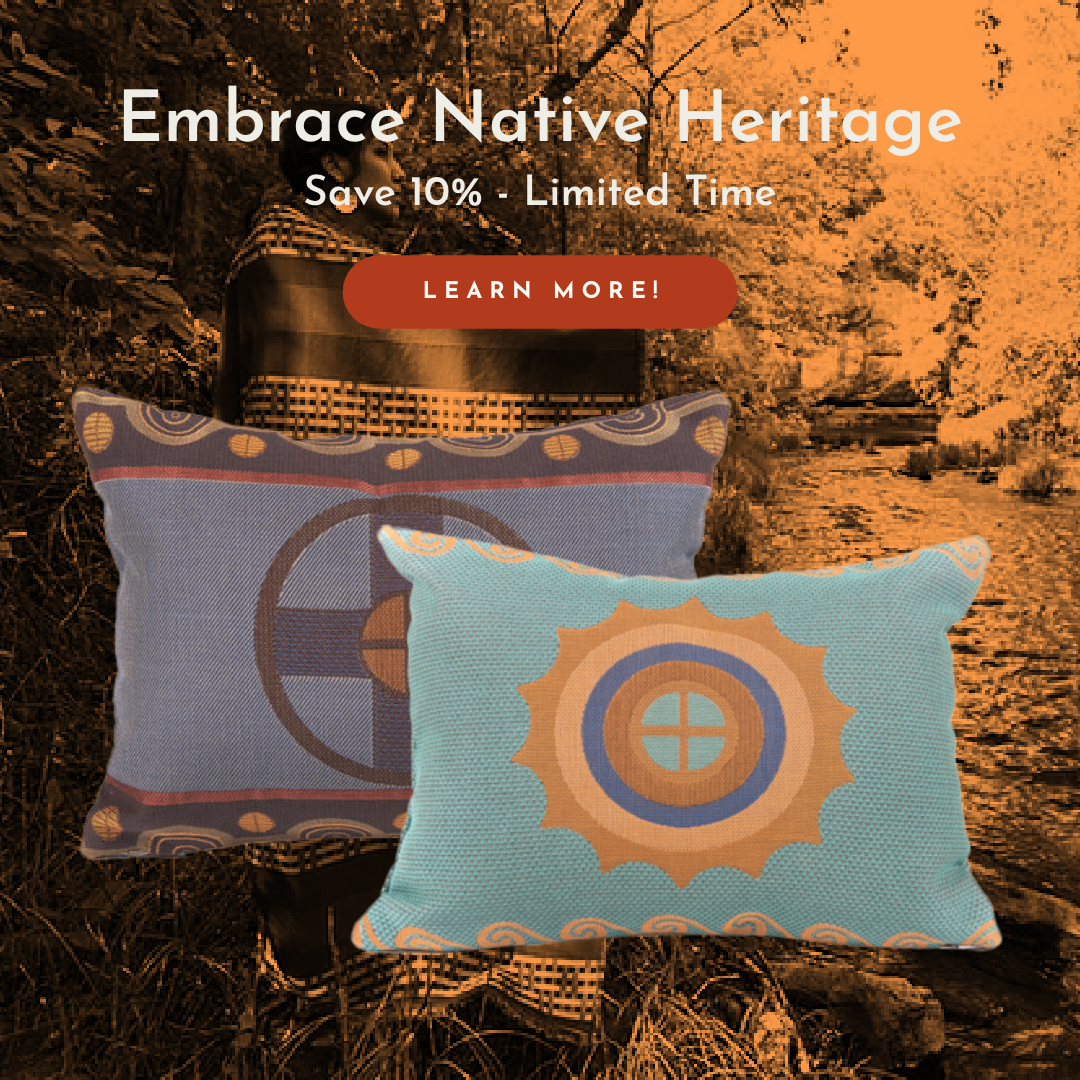
Principal Chief Hill and Second Chief Beaver re-elected for four more years
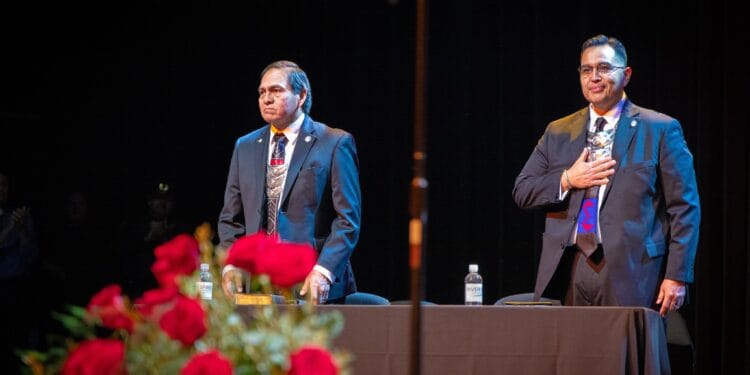
MCN Chiefs’ Inauguration attended by tribal dignitaries, state leaders and notable Mvskoke artists
by Braden Harper Mvskoke Media
TVLSE, Okla. – Muscogee (Creek) Nation oversaw the swearing in of MCN Principal Chief David Hill and MCN Second Chief Beaver to serve another four years in office. Both were sworn in at an inauguration ceremony at the RiverSpirit Casino and Resort on Saturday, Jan 6. The event was attended by many tribal dignitaries from the Inter-Tribal Council of the Five Civilized Tribes, as well as other tribes. Leaders from the Oklahoma State Government were present, including State Attorney General Gentner Drummond. The ceremony also saw local municipal leaders from cities around the Mvskoke Reservation and municipal leaders from Macon, Georgia.
Before the chiefs were officially sworn in, the event honored two Mvskoke citizens and a Seminole Nation citizen for their personal accomplishments and contributions to Mvskoke Nation. Lauren King was first honored for being the first Mvskoke citizen elected to serve as a U.S. Federal Judge for the Western District of Washington. Rear Admiral Calvin M. Foster was honored for becoming the first Mvskoke citizen to achieve the rank of admiral in the navy. Sterlin Harjo was honored for his role as an executive producer on the first all-Indigenous produced television series, “Reservation Dogs”. Harjo is a citizen of the Seminole nation and claims Mvskoke heritage.
Former MCN Chiefs, current and former national council representatives, as well as former and current cabinet members were recognized in the audience for their contributions to the tribe.
Principal Chief Hill and Second Chief Beaver were sworn into office in the Mvskoke language by Supreme Court Vice Chief Justice Mekko George Thomas.
In Second Chief Beaver’s speech he touched on the accomplishments of the administration’s past four years in office, as well as the challenges it has faced as well. Second Chief Beaver noted that his favorite part of the job is meeting new people from around the tribe and around the country. To him, the inauguration was special because of the support by everyone who attended.
“Today is about celebrating, it’s a great day today,” Second Chief Beaver said. “Everyone, not just the Muscogee (Creek) Nation but all nations back each other, we support one another. There’s a greater good out there that we believe in and that’s everyone in Oklahoma.”
In Principal Chief Hill’s speech he detailed how the nation endured through paradigm-changing events including the Covid-19 Pandemic, and the historic McGirt Supreme Court Decision. In spite of these great trials and tribulations, Principal Chief Hill remarked that he still found great support and encouragement from the tribe. According to him, the tribe is much more than just it’s chief.
“I pledge to do my very best to uphold the trust you have placed in me,” Principal Chief Hill said. “The title of principal chief is not for one person. But no one can do this job alone, it takes an incredible team and staff to make things happen for citizens everyday. And it takes citizens to support the vision for this great nation’s growth, prosperity and progress.”
The ceremony concluded with a Mvskoke Hymn led by MCN Lighthorse Chief of Police Richard Phillips

Cherokee Nation receives Environmental Excellence Award from Keep Oklahoma Beautiful

OKLAHOMA CITY — The Cherokee Nation was recognized for having one of the top clean energy programs in the state during the Keep Oklahoma Beautiful 2023 Environmental Excellency Celebration held recently at the National Cowboy & Western Heritage Museum.
The Cherokee Nation received an Environmental Excellence Award in the Tribal Government Programs category for the tribe’s work in expanding electric vehicle infrastructure and installing community solar panel systems.
“The Cherokee Nation is at the forefront of environmental infrastructure and initiatives thanks to the outstanding professionals within our Environmental Protection Commission and Secretary of Natural Resources Office,” Cherokee Nation Deputy Chief Bryan Warner said. “Wado to Keep Oklahoma Beautiful for honoring our tribe for the important environmental work it does. This award speaks to the impact the Cherokee Nation continues to make in environmental protection and preservation across our 14-county reservation.”
The tribe has completed projects introducing eco-friendly electric buses and solar-panel-equipped charging stations in various communities throughout the reservation. Each of the 20 projects is equivalent to removing multiple vehicles from the road, planting more than 10,000 trees and saving hundreds of thousands of pounds of coal.
“Clean energy projects are important to the preservation of our precious natural resources and quality of life for our citizens. We are constantly working to expand these types of projects across the reservation as we work to meet Principal Chief, Chuck Hoskin Jr.’s goal to reduce our carbon footprint by 25% by 2027. We appreciate Keep Oklahoma Beautiful’s recognition of these monumental efforts.
Each year, Keep Oklahoma Beautiful calls for nominations for environmental awards in several categories. The prestigious awards are presented at the organization’s annual Environmental Excellence Celebration, where the best of the environmental best in Oklahoma are honored each November.
Keep Oklahoma Beautiful is a statewide nonprofit organization founded in 1965 and is a state affiliate of Keep America Beautiful, which is a nonprofit organization with a national network of nearly 1,000 participating organizations working together to improve communities through litter prevention, waste reduction, and beautification.
More information on the Cherokee Nation Environmental Protection Commission can be found by visiting https://www.cherokee.org/our-government/environmental-protection-commission/. For more information on the Cherokee Nation Secretary of Natural Resources Office, visit https://www.cherokee.org/our-government/secretary-of-natural-resources-office/.
Bearshaw Beauty Began with One Woman’s Search for All-Natural Beauty Products
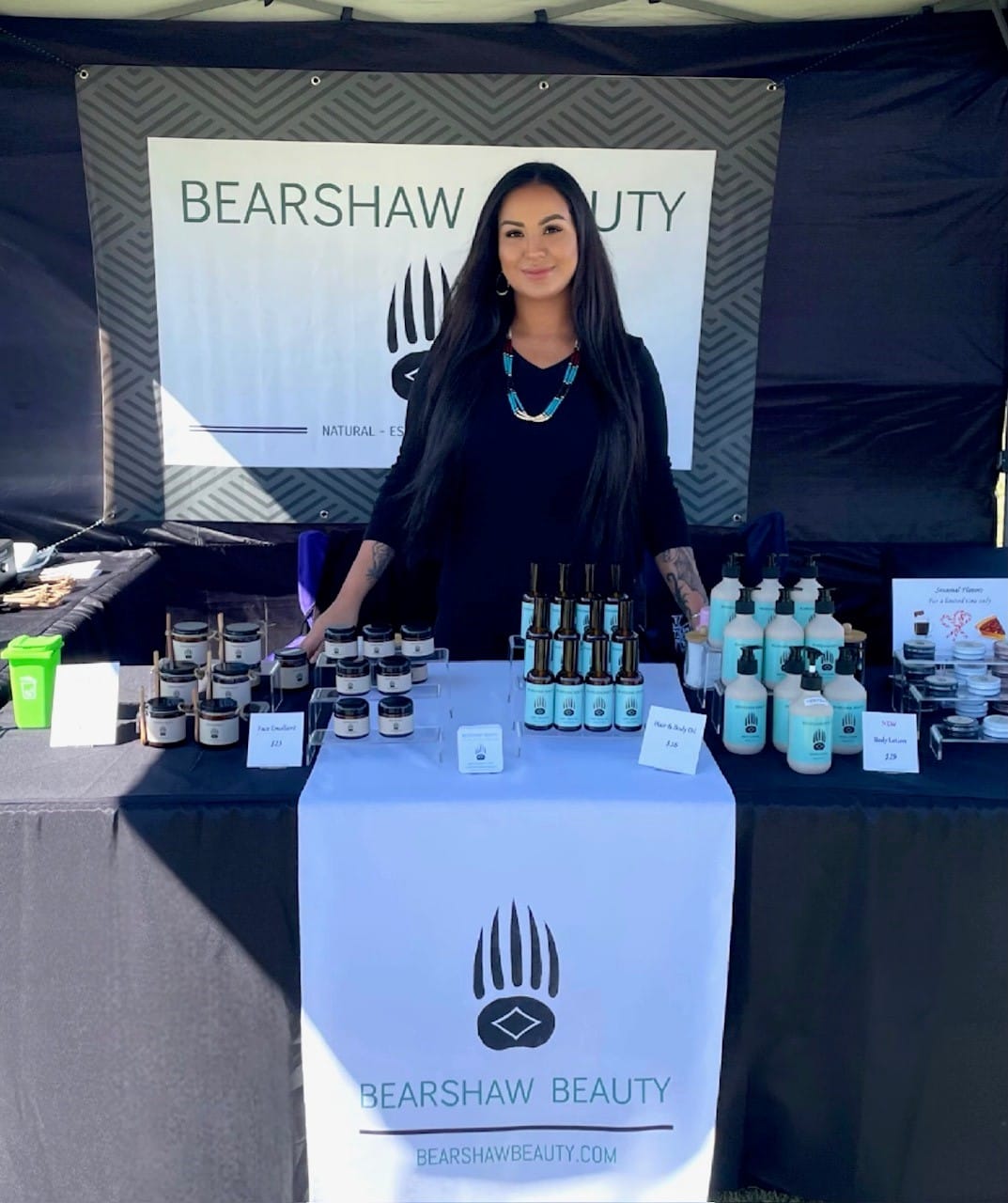
by Ryann Gordon
Finding all-natural beauty products isn’t easy, and for Jasmine Bear, owner of Bearshaw Beauty and Snag Dating App, it was a feat worth endeavoring. Based out of Tulsa, OK, Jasmine is a native business owner and entrepreneur (Osage/Mvskoke/Cherokee/Choctaw/Seminole) whose search for natural alternatives for her beauty products led to a thriving business in just over a year. And it all began with her homemaking skincare products for personal use.
“I wanted to use something more natural that my skin would respond well to,” says Jasmine, who launched Bearshaw Beauty just over a year ago, on Native American Day 2022 at Dream Keepers Park. In preparing for the debut, she gathered her products and perfected the packaging with all reusable, recyclable materials and chemical-free products.
The origin of Bearshaw Beauty goes back further, though. While looking at product labels for beauty brands, she began scrutinizing unrecognizable ingredients and questioning the extensive ingredient lists. Seeing all the chemicals and unfamiliar ingredients in just about every beauty product she’d come across, she took matters into her own hands and began making her own beauty elixirs.
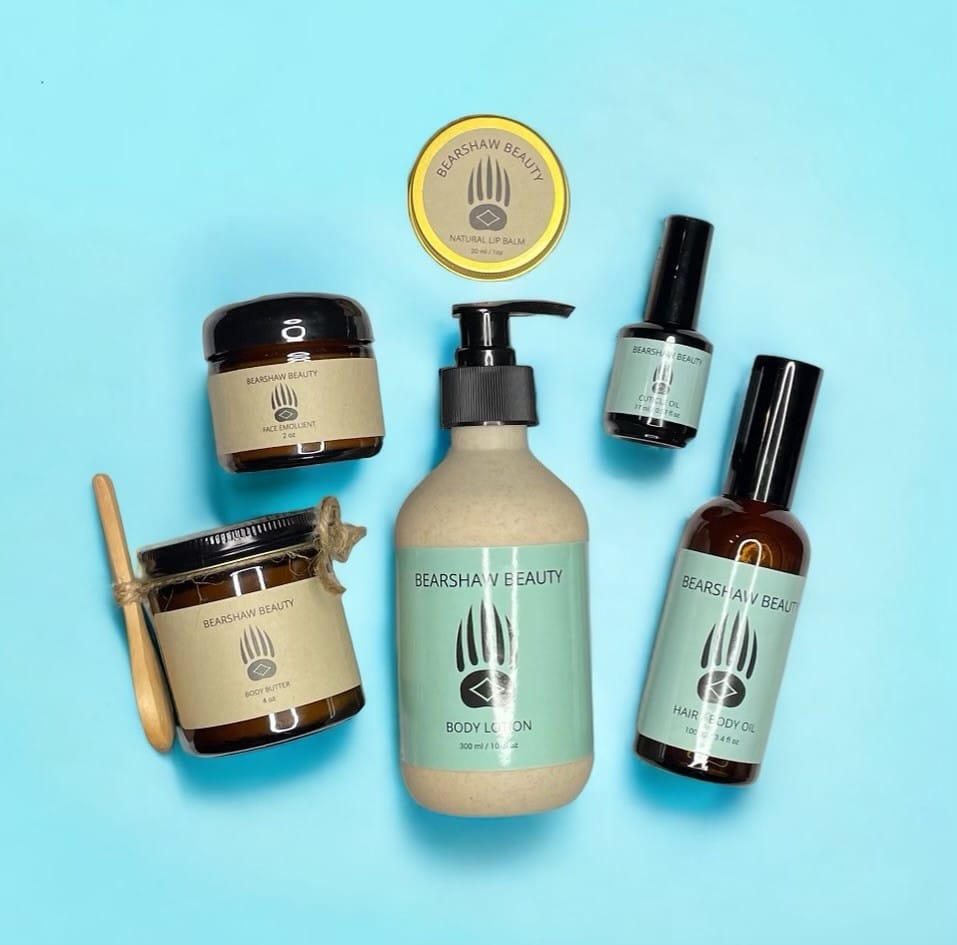
“I noticed that a lot of beauty products sold in stores are manufactured in Europe, Dubai or Korea, and a lot of the ingredients are unpronounceable,” she says. “We don’t know what it is and what we’re putting on our bodies, so I started making my own and giving it to my sisters or friends and they gave me really good feedback on it, so I decided to mass produce it. Because they are very minimal, high-quality ingredients, and they’re also natural.”
Rather than using chemicals or unfamiliar ingredients, Jasmine sought out simple ingredients that people know and enjoy, and quality sources she knew she could trust. Once she had that, she started expanding her products list. She put her lab gear on and start creating new mixtures and sampling them herself.
“I did all the research myself,” she says. “The first product I made on my own was the lip balm, then I went to body butter. The lip balm I get a lot of good feedback on, because it is only four ingredients and your lips don’t get addicted to it like how they would with Blistex or Carmex, so it feels better and it lasts a very long time.”
While some products use essential oils, her lip balms come in three flavors, Honeysuckle, Wild Strawberry and Hickory Nut, which she outsources from a company that’s certified organic.
“I did a lot of research and found the most natural flavor oils,” she says. “And it makes good gifts, so I’m doing seasonal lip balms. I just made those; there’s a Pecan Pie, a Candy Cane and Hot Cocoa.”
In doing her research and learning the ins-and-outs of the ingredients, like with most things, Jasmine ran into obstacles that had to be overcome. And she learned a lot along the way.
“I was trying to figure out how to get my micro-powder in my Hair & Body Oil to not just fall to the bottom,” she says. “It settles and I wanted it to be throughout the bottle more. I tried using beeswax and I didn’t know it wasn’t an emulsifier, so it made it to kind of a paste once it cooled. So I had to do research on what an emulsifying wax is and find something else so it settles a lot slower. Now, you just shake it a little bit and it distributes the powder slowly.
“The powder is heavier than the oil, so I had to figure that out. And I didn’t want it to be too waxy, because that’s something I don’t like is when you have a body oil that’s feels really waxy. I wanted it to be as natural as possible and just absorb into your skin. Then it was just about finding more balance — if you think it’s too thick, you know, finding the right consistency you like.”
In expanding her products, she even found new additions to her skincare routine she didn’t know she needed.
“My current favorite is the face emollient,” she says. “It has a slight cucumber melon scent to it. It’s not too much, because I didn’t want it to be too overpowering since it goes on your face. It’s my favorite because it has Shea butter and vitamin E oil in it; it has Aloe Vera gel that’s un-died and alcohol-free. It’s a very simple recipe but it does hydrate my skin very quickly. Especially in cold weather, when you get dry around your nose and chin. You put that cream overnight and it’s perfectly hydrated in the morning. And you just need a little bit, so it lasts. It’s my favorite thing.”
What began with one woman’s search for natural beauty products led to the creation of Bearshaw Beauty — but that’s not the only quest that Jasmine Bear’s facilitated. Her latest project, the Snag App.
“The Snag App is a social networking app for indigenous users,” she says. “It has a feature in it called Native Network, which is kind of like Facebook but for Indians. Snag, the dating feature, is more like Tinder, but for Native Americans.”
Along with these endeavors, Jasmine Bear dances traditionally Osage in District Gray Horse (yes, the district in Killers of the Flower Moon, which she starred as an extra in). An active member of the tribe, she’s also a wife and mother, and fosters children for Muscogee Creek Nation.
